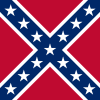| Online: | |
| Visits: | |
| Stories: |

| Story Views | |
| Now: | |
| Last Hour: | |
| Last 24 Hours: | |
| Total: | |
Confederate Constitution and Jeffersonianism
By Hunter Wallace
The Confederate Constitution included these two big changes from the US Constitution:
“(1) To lay and collect taxes, duties, imposts, and excises for revenue, necessary to pay the debts, provide for the common defense, and carry on the Government of the Confederate States; but no bounties shall be granted from the Treasury; nor shall any duties or taxes on importations from foreign nations be laid to promote or foster any branch of industry; and all duties, imposts, and excises shall be uniform throughout the Confederate States …
(3) To regulate commerce with foreign nations, and among the several States, and with the Indian tribes; but neither this, nor any other clause contained in the Constitution, shall ever be construed to delegate the power to Congress to appropriate money for any internal improvement intended to facilitate commerce; except for the purpose of furnishing lights, beacons, and buoys, and other aids to navigation upon the coasts, and the improvement of harbors and the removing of obstructions in river navigation; in all which cases such duties shall be laid on the navigation facilitated thereby as may be necessary to pay the costs and expenses thereof.”
These changes banned a protectionist trade policy and government spending on internal improvements except in rivers or coastal commerce. The spirit of the Confederate Constitution reflected the Hamiltonian vs. Jeffersonian ideological divide:
1.) Unlike the Union, the Confederacy has an export based economy that made us overly dependent on international trade. By following the law of comparative advantage, the free-market in the antebellum era had sculpted the South into a land of cotton plantations.
2.) The Southern economy was overwhelmingly dependent on the export of a single commodity – cotton. It produced an elite whose wealth was overwhelmingly derived from large cotton plantations.
3.) The Southern elite wanted free-trade because it suited their own interests: their wealth was derived from exporting their cotton to Britain, and British manufactured goods were cheaper.
4.) By banning a protectionist trade policy and government spending on internal improvements, the Confederate Constitution explicitly favored the cotton interest over manufacturing and small farmers. This is reflected in the exception which was carved out for internal improvements in ports and rivers which cotton planters relied on to export their cotton to foreign markets. Government sponsorship of railroads to promote internal commerce, however, were to be deterred.
5.) The “general welfare” clause was also removed.
6.) The thrust of all these constitutional changes was to deter industrialization and preserve the power of the planter class by hampering the creation of a more diversified economy.
Note: It was a nice pipe dream that was swiftly dispelled by the realities of war. In the end, the Confederate government was forced by military necessity to subsidize the creation of railroads, a navy, and manufacturing and other war related industries as vital imported commodities were cut off by the Union blockade. Among other things, the Confederacy was forced by the war to provide for the “general welfare” of widows, conscript troops, and to infringe on state sovereignty.
By that point, it was too little, too late. Jeffersonianism proved to be too weak a foundation on which to build an independent South. The real damage had been done in all the decades before the war.
Source: http://www.occidentaldissent.com/2015/11/07/confederate-constitution-and-jeffersonianism/



